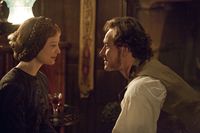MOVIE REVIEW
Jane Eyre (2011)
In a world where movies focus on outcasts in superhero outfits and the nerd is currently king, it is a pleasure to note that there is at least one real man in Hollywood: That man is named Michael Fassbender, the Irish-German leading man willing to do many things for his art. These include playing a convicted terrorist in "Hunger," an adulterer willing to sleep with his girlfriend's teenage daughter in "Fish Tank" and a Nazi hunter who looks great in a black turtleneck in "X-Men: First Class." These roles are not the obvious route to pinup status. In fact, this career trajectory seems to belong to the new Harvey Keitel rather than the new Russell Crowe. But cinemagoers of the feminine type haven't had a man's man to admire onscreen since Mr. Crowe leapt, shotgun first, through the hotel floor in "L.A. Confidential." So Mr. Fassbender's work — whatever he does — is very greatly appreciated.
In the original novel by Charlotte Brontë, Edward Rochester sets the archetype for all the bad boyfriends to come: He broods; he smolders; he charms; he throws tantrums; he probably has an illegitimate daughter; he's intelligent; he's sarcastic; he's nice to the help; he's rich; he's dangerous; he's smoking hot. Brontë phrased it slightly differently. Any actor who plays the part must instantly balance the appeal but also the danger, and Mr. Fassbender is exactly right. But he is just one part of the unexpected success of Cary Joji Fukunaga's "Jane Eyre."
Mia Wasikowska, as self-contained Jane, is also perfect as the intelligent orphan who — in making her own way in the world — finds herself in Rochester's isolated house with only chatty housekeeper Mrs. Fairfax (Judi Dench, also perfect as ever) for company, as the governess to French-speaking Adele (Romy Settbon Moore). She has ended up here after the archetypical rotten childhood, first in the household of an unloving aunt (Sally Hawkins, neither happy nor lucky) and then a miserable boarding school. Jane is hugely vulnerable but completely unafraid, the rare combination which has allowed her story to endure. Ms. Wasikowska is very good at showing Jane's directness, fundamental goodness and fierce moral code without fuss.
Horror tropes are used lightly throughout but to great effect, especially in an early scene where young Jane (Amelia Clarkson) is so terrified she actually knocks herself unconscious. The plot twist — which is only slightly less well-known than Rosebud — is foreshadowed with a creeping sense of unease, mysterious noises in the attic and unexplained, secret fires. But even when you know it is coming, the plot twist still shocks, due to the depth of Rochester's betrayal. It was also exciting to note use of the name Antoinette, which was a development from Jean Rhys's parallel novel "Wide Sargasso Sea" (which itself was adapted into a pretty good British TV movie starring Rebecca Hall in 2006; ignore the NC-17 Hollywood version from 1993). Screenwriter Moira Buffini, who recently adapted "Tamara Drewe," really did her homework.
It is unfortunate that our jaded modern selves do not quite thrill to the dialogue in the same way that Brontë's original audience did. Simon McBurney as a sadistic teacher gets the worst of it; but the scenes of devastating passion between Jane and Mr. Rochester — which seem directly transcribed from the novel — inspired a few sniggers. Our morality and rules for sexual conduct have changed, which was the only reason for the laughter. Ms. Wasikowska especially gets the tone exactly right, which means the movie is not overwhelmed by the sometimes fervid dialogue.
This modern sensibility shows in little touches throughout the movie, most noticeably in the casting a black actor as one of Mr Rochester's servants, highlighting the Jamaican influences in the story. It was also great to see Jamie Bell continue to make interesting career choices as a secondary lead. Mr. Fukunaga's previous film was "Sin Nombre," about the journey illegal immigrants must make to cross into the United States from Mexico, so this adaptation was not the obvious next choice for him. He demonstrates an unusual gift for using the weather to evoke mood, not least in the fantastic shots of Ms. Wasikowska alone on the moors as a storm begins in the distance. The mix of Mr. Fukunaga's unpretentious style and a bone-deep understanding of 1840s Yorkshire work thrillingly well. But many women will just want to admire Mr. Fassbender, for which "Jane Eyre" is an excellent opportunity.
JANE EYRE
Opens on Sept. 9 in Britain.
Directed by Cary Joji Fukunaga; written by Moira Buffini, based on the novel by Charlotte Brontë; director of photography, Adriano Goldman; edited by Melanie Ann Oliver; music by Dario Marianelli; production design by Will Hughes-Jones; costumes by Michael O’Connor; produced by Alison Owen and Paul Trijbits; released by Universal Pictures. Running time: 2 hours 1 minute. This film is rated PG.
WITH: Mia Wasikowska (Jane Eyre), Michael Fassbender (Edward Rochester), Jamie Bell (St. John Rivers), Amelia Clarkson (Young Jane), Sally Hawkins (Mrs. Reed), Freya Parks (Helen Burns), Holliday Grainger (Diana Rivers), Tamzin Merchant (Mary Rivers), Imogen Poots (Blanche Ingram), Valentina Cervi (Bertha Mason) and Judi Dench (Mrs. Fairfax).

Comments